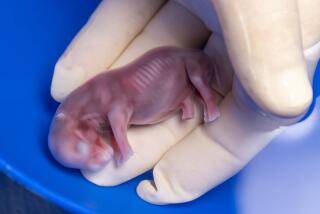Doctor Reports Ability to Clone Human Embryo : Science: Experiment hints of day parents could replicate their children, newspaper says.
- Share via
NEW YORK — In an experiment believed to be the first of its kind, a researcher in Washington has cloned human embryos into identical twins or triplets, according to a published report.
Dr. Jerry Hall of George Washington University Medical Center was trying to devise a method to create more embryos to implant when couples do not produce a sufficient number for in vitro fertilization, according to today’s editions of the New York Times.
Hall is in the university’s in vitro fertilization program, in which doctors help women have babies by mixing sperm and eggs in a laboratory and then implanting fertilized eggs in the women.
He declined to be interviewed by the Times, which based its report on a summary of a paper that Hall presented at an Oct. 13 meeting of the American Fertility Society.
In the summary, the Times said, Hall wrote that by splitting the embryos into twins or triplets or quadruplets, doctors could try to implant more embryos, making it more probable that a woman could become pregnant.
A description of the findings is scheduled to appear next week in Science magazine, the paper said.
The results suggest that one day it would be possible for parents to have a child and then, years later, use a cloned, frozen embryo to give birth to an identical twin, possibly as an organ donor for the older child. Human embryos can be frozen and used at a later date.
The embryos used in Hall’s experiment were at the stage of just a few cells, the paper said. They were not usable for technical reasons and were discarded.






